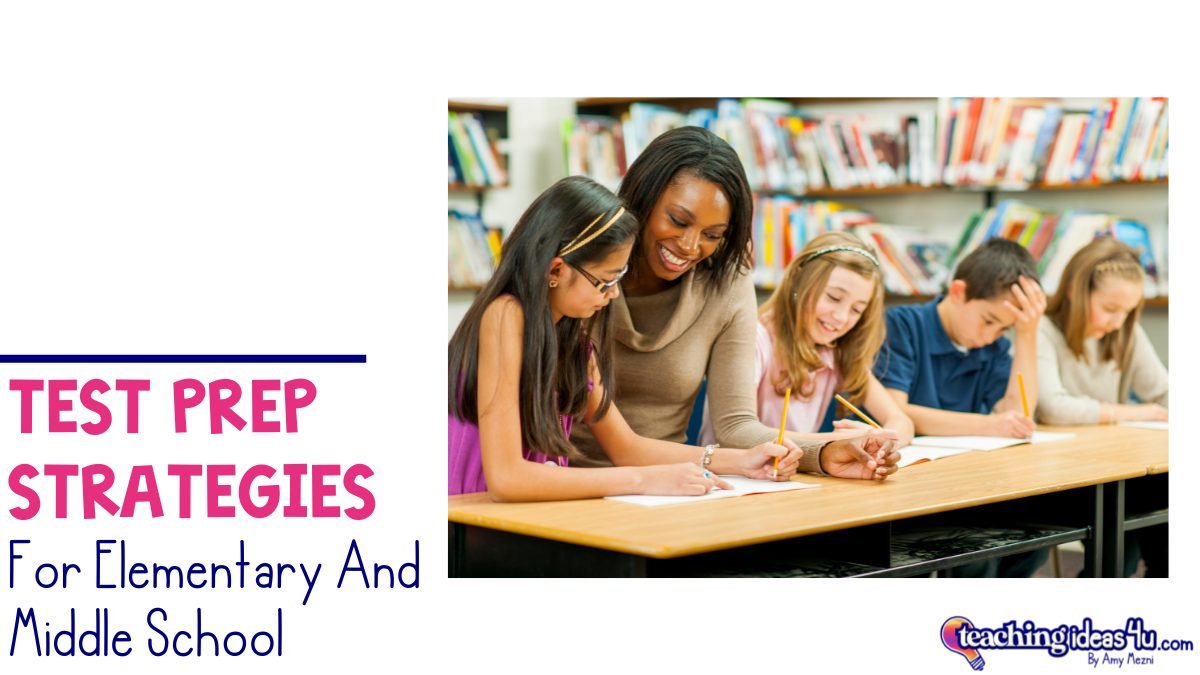Test Prep Strategies For Elementary And Middle School
Teachers all know students need to review skills - or lose them. Many times, elementary and middle school teachers wait until right before the state exam and cram in test prep review at the last minute. While better than nothing, there are more effective strategies to use for test prep.
In reality, teachers should stop reviewing for the test and use strategies to ensure students master skills and concepts. If students learn the standards, they will most likely do well on the test.
(Why do I say most likely? Because knowledge is just one factor that affects students’ test scores. Others include stress/nerves, reading comprehension, and familiarity with question styles and test format.)
So how can teachers review more effectively? This post will give you a number of tips that you can easily apply in your classroom.
Start Early
Instead of reviewing at the last minute, teachers should start at the beginning of the year. A lot of teachers use pre-tests and spiral review activities, and they are excellent places to start. However, spiral review won’t be as effective if you aren’t sure which concepts your students need.
Unless you move up with your students, you probably aren’t sure what each student knows or what gaps or misconceptions they may have. Pre-tests can give you an idea. However, schools that use pre-tests often give one on the current grade level. While they identify which students have advanced skills, it doesn’t tell you what they missed in previous grades.
Instead, give students a test based on last year’s expectations. That will tell you what students know well, as well as what you need to review. Especially in classes that build on previous knowledge, you need to know what holes you need to fill. A test based on what students should already know will allow you to plan targeted activities to support your students.
Small Groups & Differentiated Activities
Once you have the data from the pre-test, use it to differentiate your instruction. When students are working on skills or doing centers, group them by topic. For example, some students may struggle with writing a topic sentence, while others need help with paragraphing. These groups are fluid and should change as students master skills.
You can also assign different activities during centers - target each students’ task to a skill they need to review. Preparing multiple centers can take a lot of time, but there are ways to make it easier:
If you have a parent volunteer or aide, have them help you.
If you are using printable activities, make a table of the activities you have for each skill so you can access them quickly.
If you have technology, find games that allow you to assign topics to each student. For example, my BalloonPop™ games review specific skills. With a bundle, you can select which skill each student works on.
Daily Warm-Up
Teachers call bell ringers by many names, but no matter what you call them, you can use these activities for review. I know I said we should stop reviewing specifically for the state test, but you do need to familiarize students with the types of questions they will see on the exams. Be sure to use test-question formats and questions at a variety of difficulty levels.
You don’t need to use a “test” question every day, but it’s a great time to sprinkle in test practice without emphasizing the test (which stresses out many students.) An easy way to get these questions is to download a copy of the tests that your state releases to the public. Find a question on the topic you need and use it. Just keep track of which questions you have used - but you may want to reuse them later to double-check students’ skills.
Use Review As A Reward
If you tell your class you are going to review, the response will most likely be a groan. However, if you tell students they can earn game time, they will be more inclined to work for it and be excited. That game can be a test prep game - and students won’t even realize they are reviewing.
You can make your own games, or I have many premade games available for grades 3 - 6. So many reviews on my games are like Annie’s, “This is a fabulous resource and my kids LOVED it!”
If you would like a ready-to-go game, check out the ones I have - just use the categories that are to the left in my TPT store to easily find ones for your grade level.
Progress Monitor
It’s important for you to check your students’ progress throughout the year. Once students improve their skills, you want to move them to a different skill. You also want to check which new skills they may need to review. As the year goes on, continue using a tool to help you see both your students’ growth and gaps.
My district had required tests, so if yours does as well you could use those for progress monitoring. If not, see if your administration will get one or will support you and your teammates developing one.
Do you want more help with test prep review?
On my blog, I have many resources to help you with test prep. There are articles and videos that discuss standardized testing and how to prepare students for tests. I also have a number of free resources, including strategies for standardized test questions and writing a constructed-response essay. Check out my test prep resources at teachingideas4u.com.

